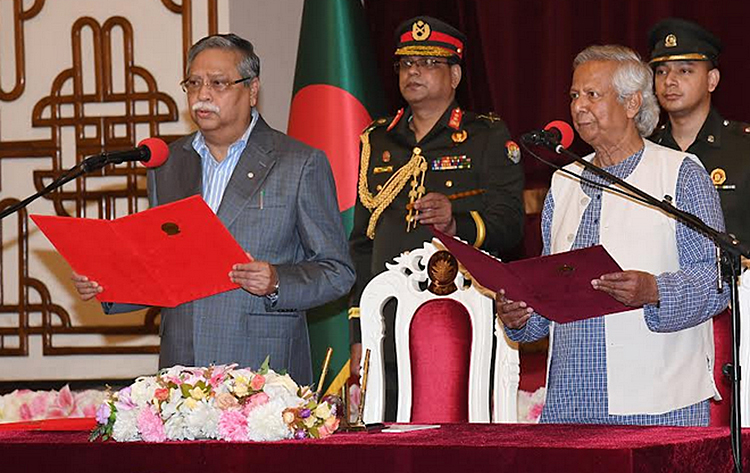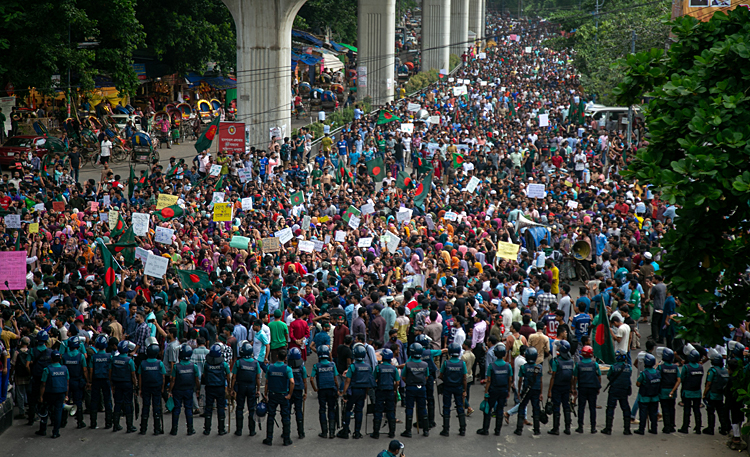INDIAN ARMED FORCES CHIEFS ON OUR RELENTLESS AND FOCUSED PUBLISHING EFFORTS

The insightful articles, inspiring narrations and analytical perspectives presented by the Editorial Team, establish an alluring connect with the reader. My compliments and best wishes to SP Guide Publications.

"Over the past 60 years, the growth of SP Guide Publications has mirrored the rising stature of Indian Navy. Its well-researched and informative magazines on Defence and Aerospace sector have served to shape an educated opinion of our military personnel, policy makers and the public alike. I wish SP's Publication team continued success, fair winds and following seas in all future endeavour!"

Since, its inception in 1964, SP Guide Publications has consistently demonstrated commitment to high-quality journalism in the aerospace and defence sectors, earning a well-deserved reputation as Asia's largest media house in this domain. I wish SP Guide Publications continued success in its pursuit of excellence.
- MoD initiates comprehensive review of Defence Acquisition Procedure 2020, pushes for defence reforms
- G7: The Swansong
- Kalinga Connect: South Asia to Polynesia
- Advanced MRSAM for India for a greater firepower
- Must Credit DRDO for Operation Sindoor, now what is next for defence R&D?
- Operation Sindoor | Day 2 DGMOs Briefing
- Operation Sindoor: Resolute yet Restrained
East Pakistan: Re-launched
Former Bangladesh Prime Minister Sheikh Hasina had claimed a few months back that 'conspiracies' were being hatched to topple her government and that she may be assassinated just like her father
 |
The Author is former Chief of Staff of a frontline Corps in the North East and a former helicopter pilot. He earlier headed the China & neighbourhood desk at the Defence Intelligence Agency. He retired in July 2020 and held the appointment of Addl DG Information Systems at Army HQ. |

Muhammad Yunus said emotionally at a press conference at the airport on his way to take the oath of office as head of Bangladesh's interim government, "We have got independence for the second time. We have to protect this independence," he added, referring to the ouster of ex-Prime Minister Sheikh Hasina as the country's "second independence". The statement by Yunus is open to interpretations. If this is the second independence, which was the first? Is he referring to December 1971 or to August 1947? To get an answer to this vexed question, another question may provide clues. Qui Bono?
Student Protests and the Quota System
At the heart of the student protests that began in late June was the demand to scrap a quota system that reserved up to 30 per cent of government jobs for relatives of veterans who fought in Bangladesh's war of independence in 1971 against Pakistan. Protesters have argued that the quota system was discriminatory and benefitted supporters of Sheikh Hasina, whose political party, the Awami League, led the independence movement. They demanded it be replaced with a merit-based system.
At the heart of the student protests was the demand to scrap a quota system that reserved up to 30 per cent of government jobs for relatives of veterans who fought in Bangladesh's war of independence in 1971 against Pakistan
Sheikh Hasina's government had halted the job quotas following mass student protests in 2018, but last month a high court ruling nullified that decision and reinstated the quotas after relatives of the 1971 veterans filed petitions. On July 21, 2024, the Supreme Court ordered that 93 per cent of government jobs would be allocated on merit and five per cent would be for veterans who served in the war. The remaining two per cent would be reserved for members of ethnic minorities and transgender and disabled people.

Since the protests were held in the context of 30 per cent reservations which was first reinstated by a High Court order and not the government and was now pared down to five per cent by the Supreme court, it should have logically halted the agitation. But the context was now used as a pretext, to launch all out attacks across the country, including vandalism and arson targeting government buildings, offices of the ruling Awami League party, police stations and houses of public representatives. Here the insidious role of Jamaat-e-Islami and its students wing, Islami Chatra Shibir come to the fore.
Role of Jamaat-e-Islami and Political Upheaval
A backgrounder on the history of Jamaat is necessary. Founded by Sayyid Maududi in 1941, it was associated with Muslim Brotherhood. Jamaat was against the idea of creation of Bangladesh and fought alongside the Pakistani Army against the Awami League and its military outfit, Mukti Bahini. In Mirpur, a suburb of Dhaka, its leader Abdul Kader Mollah led a mob that killed 350 unarmed civilians, earning the sobriquet "Butcher of Mirpur". After the humiliating surrender of the Pakistani Army on December 16, 1971, Mollah and other Jamaat leaders fled to Pakistan to wait for the right opportunity.
Till the COVID pandemic hit the global supply chain and upended the growth story of many countries worldwide, Bangladesh was hailed as an economic miracle
It didn't take very long. Sheikh Mujibur Rahman along with family members were brutally assassinated in a coup on August 15, 1975 by the Army led by Lt General Ziaur Rahman who launched the Bangladesh Nationalist Party (BNP) to legitimise his rule. Secularism was removed from the constitution, Fridays were observed as the weekly holiday instead of Sundays and Jamaat made a triumphant return. Over years it has established thousands of Quami madrasas with millions of students who are unfit to take up any meaningful jobs, getting sucked into the whirlpool of Jamaat as its faithful foot soldiers.
The June students' protest was cleverly hijacked by the BNP and Jamaat aided by the ISI to take ona more sinister hue. The goalposts were changed. Other issues were brought up like corruption, nepotism, joblessness and the admittedly inept and brutal handling of the initial protests by Sheikh Hasina administration that saw over 300 students being killed in police firing before the SC order.
External Pressures and Conspiracies
Till the COVID pandemic hit the global supply chain and upended the growth story of many countries worldwide, Bangladesh was hailed as an economic miracle. Its singular focus on exporting textiles and apparel delivered rapid growth, lifting millions out of poverty and winning Sheikh Hasina fame and admiration. For more than a decade under Sheikh Hasina, the economy grew at a blistering pace, in some years crossing sevenpercent. Garment exports drove more than 80 percent of the country's earnings.


The pandemic reduced global demand for textiles and apparel. With so little diversification in its economy, Bangladesh was unable to pull in enough revenue from other industries to help pay the bills. It was forced to seek a loan from the IMF in 2022.
There were other external forces coming in to play. Sheikh Hasina had claimed a few months back that "conspiracies" were being hatched to topple her government and that she may be assassinated just like her father. She had also alleged a "white man's" plot to carve a new "Christian country" like East Timor out of Bangladesh and Myanmar. The disturbances in Manipur led by the mainly Christian Kuki-Zo tribes should be viewed from this prism.
For India, sharing a 4,096 kms international borders which has proved porous despite fencing large tracts, illegal migration and cross-border terrorism are looming threats for the immediate future
China also had been wary of Hasina's pro-India tilt and put pressure for key infrastructure projects in the country, one reason why she had to cut short her China visit by a day, returning on July 10, 2024 night. What role this could have played in her ouster remains in speculation.
Sheikh Hasina had also claimed that she was offered an easy re-election in January if she had allowed a foreign country build an airbase in Bangladesh. She had been critical of sanctions on Russia on account of war in Ukraine, irking the US.
Geopolitical Ramifications for India
Put together, the forces arrayed against Sheikh Hasina are also forces that are aligned against India and historically critical of India's role in the liberation of Bangladesh. The ouster gives fillip to jihadists and radical elements led by Jamaat. For the US deep state, they can now pursue their agenda more aggressively. For China, it will ease its efforts to make deep inroads into Bangladesh, duly helped by ISI to stymie India.
For India, sharing a 4,096 kms international borders which has proved porous despite fencing large tracts, illegal migration and cross-border terrorism are looming threats for the immediate future. As the fastest growing large economy in the world, keeping our heads up in a region surrounded by failed states will challenge the tenacity of Indian statecraft to the hilt.





